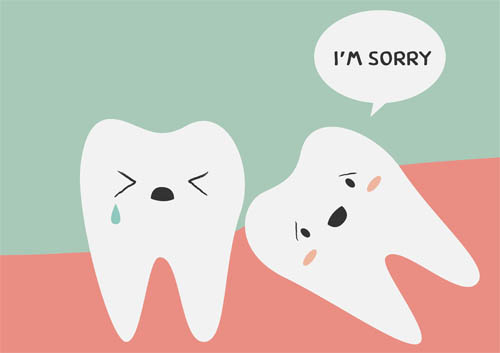Top Five Best Foods for Oral Health
June 25th, 2025

Some foods are just terrible for your teeth — think cookies and candy bars — but there are certain foods that are beneficial to your oral health. Below, Drs. Angela Paros, Amer Atassi, Eric Young, Alexander Katsnelson and our team have covered five of the top foods to keep your teeth and gums healthy!
1. Crispy, low-acid fruits and vegetables: Fruits like apples and vegetables such as carrots and celery act like “natural toothbrushes,” helping to clear plaque from your teeth and freshen your breath.
2. Kiwis: These little green superstars are packed with vitamin C which is essential for gum health. The collagen in your gums is strengthened when you consume foods that are high in vitamin C, like kiwis, thus helping to prevent periodontal problems.
3. Raw onions: Onions have long been studied for their antimicrobial, antibacterial, and antioxidant properties. Proliferation of bacteria is what leads to tooth decay and cavities. By including raw onions in your diet, you'll be doing your part to wipe out those little microbes before they can multiply!
4. Shiitake Mushrooms: A specific compound in shiitake mushrooms, lentinan, has been shown to have antibacterial properties that target the microbes that cause cavities while leaving other beneficial bacteria alone. It may also help prevent gingivitis, or inflammation of the gums.
5. Green Tea: Often lauded for its high antioxidant content and many health benefits, it turns out green tea also benefits your oral health! A Japanese study found men who drank green tea on a regular basis had a lower occurrence of periodontal disease compared to men who drank green tea infrequently. It's believed this is due to the catechins in green tea, a type of flavonoid that may help protect you from free radical damage, but more research needs to be done. Either way, drink up for your overall health, as well as your teeth!
If you have any questions about your oral health, or are looking for even more oral health tips, contact our Romeoville, IL office!
Suffer from Dental Anxiety? Not a Problem.
June 18th, 2025

If you suffer from dental anxiety, we understand that paying a visit to our office can seem like a nearly impossible mission. Regardless of what the root of that anxiety might be, we’re here to tell you that at High Point Dental Group, you have no need to be nervous. Our office is dedicated to making your dental experience as comfortable and stress-free as possible.
One of the best things to do if you experience dental anxiety is call our office in advance to let us know. By notifying us in advance, you give us the opportunity to provide you with the dental care you need in the way you need it.
We can prescribe a relaxation medication for you. During your appointment, we can provide a little bit of laughing gas to put you more at ease, teach you some behavioral techniques for relaxation, and make sure you’re never in the dark about what’s happening.
If dental anxiety makes you feel embarrassed, please be assured that you’re not alone. Studies show that as much as 75% of adults suffer some degree of dental anxiety! It might be helpful to remember that your doctor’s goal is the same as yours: We are here to keep your oral health in check so you can be your healthiest self. We certainly don’t want to make you uncomfortable in the process.
If you have any questions about other ways in which we can accommodate you during your visits, please don’t hesitate to contact our Romeoville, IL office!
Warning Signs of Impacted Wisdom Teeth
June 11th, 2025

When your wisdom teeth start to emerge it can definitely be painful, but it can be even worse if your wisdom teeth become impacted. Impacted wisdom teeth are trying to erupt but are unable to do so because there is not sufficient room for them to emerge. This usually means that your wisdom teeth are painfully lodged in your jawbone.
While you may not see any real signs of the emerging wisdom teeth when they are impacted, what you can’t see can still definitely hurt you. Some of the indicators of impacted wisdom teeth are listed below.
- Jaw Pain: Pain in the back of your jaw is a common indicator of impacted wisdom teeth. The pain often concentrates in the area around your gums.
- Changes in the Mouth: You may notice some changes in your mouth when you have impacted wisdom teeth. Reddish gums, swelling in the jaw, bleeding gums, and bad breath can all be indicators that you are dealing with impacted wisdom teeth.
- Headaches: If you suddenly start having headaches, especially at the same time as some of the other issues mentioned above, they may indicate impacted wisdom teeth.
- Chewing Issues: Problems with chewing normally can indicate impacted wisdom teeth. If you are having trouble making the chewing motions because your mouth won’t quite open and close as easily as it used to, impacted wisdom teeth may be the culprit.
The Solution
If you are suffering from impacted wisdom teeth, the best solution is usually going to be removal. This is not a problem that will resolve naturally, and in fact, your pain and other symptoms may worsen as your wisdom teeth become increasingly impacted. At High Point Dental Group, Drs. Angela Paros, Amer Atassi, Eric Young, Alexander Katsnelson can review the details of wisdom teeth removal surgery with you and help you determine if this is the best solution for your situation.
Treating Gum Disease with Antibiotics
June 4th, 2025

Why does gum disease develop? Our mouths are home to bacteria, which form a film called plaque. Plaque sticks to the surfaces of our teeth, at the gumline, and can even grow below the gumline. And this bacterial growth leads to inflammation and gum disease.
When the disease progresses, the gums gradually pull away from the teeth leaving pockets which can be home to infection. Toxins can attack the bone structures and connective tissue, which support our teeth. Left untreated, periodontal disease can lead to serious infection and even tooth loss.
Because we are dealing with bacteria, it makes sense that antibiotics are one way to combat gum disease. Depending on the condition of your gums, we might suggest one of the following treatments:
- Mouthwashes—there are mouthwashes available with a prescription that are stronger than over-the-counter antibiotic formulas, and can be used after brushing and flossing.
- Topical Ointments—These ointments or gels are applied directly to the gums, most often used for mild forms of the disease.
- Time-release Treatments—If there is severe inflammation in a pocket, we might place a biodegradable powder, chip, or gel containing antibiotics directly in the affected area. These minute methods release antibiotics over a period of time as they dissolve.
- Pills and Capsules—For more serious periodontal disease, you could be prescribed an oral antibiotic. Take in pill or capsule form as recommended, and always finish the entire prescription.
Talk to Drs. Angela Paros, Amer Atassi, Eric Young, Alexander Katsnelson at our Romeoville, IL office before beginning a course of antibiotics. It’s important to know if you have any allergies to medications, what to look for if you might have an allergy you didn’t know about, if you are pregnant or breast-feeding, or if you have any health concerns that would prohibit antibiotic use. Talk to us about possible side effects and how to use the medication most successfully. With proper treatment, we can treat gum disease as quickly and effectively as possible, and provide advice on maintaining a periodontal routine that will keep your gums and teeth healthy for years to come.






